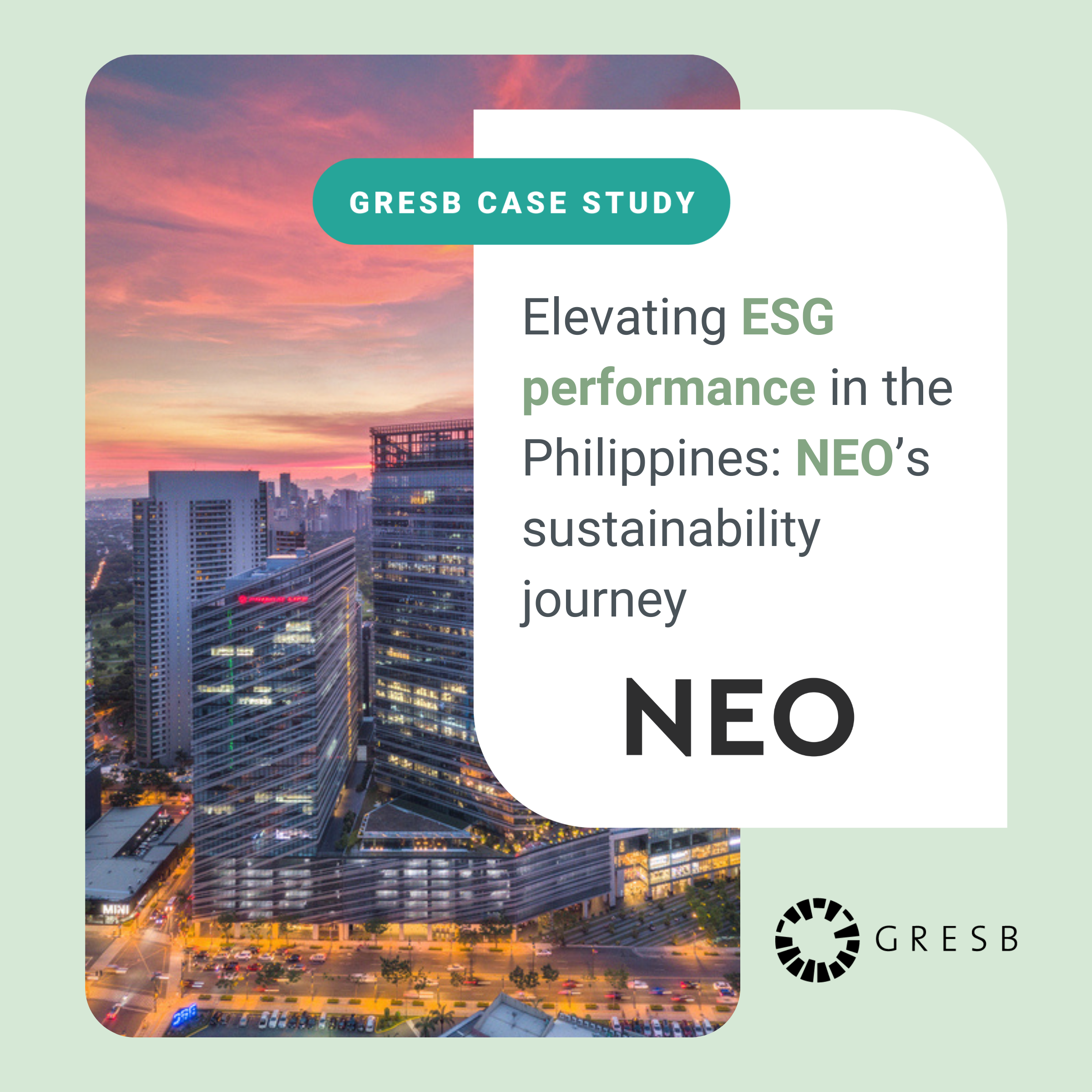About NEO
NEO owns, develops, and manages seven certified green buildings in Bonifacio Global City, Philippines, to provide a more sustainable business environment with a reduced carbon footprint. In 2013, NEO partnered with SM Investments Corporation (SMIC) to expand its office portfolio management approach.

Business type: Property company and real estate manager
Reporting region: Asia-Pacific
Use of GRESB: GRESB Real Estate Assessment
Reporting entities: 7 assets
Evolution of ESG strategy and reporting
NEO’s sustainability journey began in 2013 with a decision to adopt 100% renewable energy for on-site use. Working with AboitizPower, it shifted its portfolio of seven office buildings to run on 14.5 MW of geothermal energy from the Mak-Ban Geothermal Plant. By 2014, NEO introduced energy conservation programs and established the city’s first EV charging stations, while the transition to LED lighting in 2015 marked another significant step in reducing NEO’s carbon footprint.
Growing demand for sustainable practices and the need to differentiate in the real estate market led NEO, in 2015, to consider joining GRESB. Aligning with global standards and surpassing local regulations in sustainable real estate development was essential. GRESB provided a comprehensive framework enabling NEO to meet and exceed these requirements, demonstrating a firm commitment to sustainability through annual reporting obligations.
As Gie Garcia, Co-Managing Director and Chief Sustainability Officer at NEO, notes: “Our ESG journey progressed with our strong commitment to sustainability. With our strong focus on energy efficiency, GRESB has guided us in our goal of expanding our approach to ESG principles.”
Using the GRESB framework
Since 2016, NEO’s use of GRESB Assessments has enabled it to expand on its earlier initiatives in energy efficiency to also consider the social and governance aspects of its ESG approach. Socially, stakeholder engagement has been prioritized to ensure the active involvement of tenants, employees, and community members in the sustainability journey; governance structures have been reinforced by the development of comprehensive policies to address the most viable sustainability topics identified through the GRESB Assessment.
Additionally, GRESB participation has also helped NEO strengthen its risk assessment processes, enabling the proactive identification of areas that require attention to both mitigate uncertainty and streamline aspects of its operations. The key to expansion in these areas has been a switch to the comprehensive, regular collection of data.
GRESB data has been crucial in identifying specific areas for operational improvement, comparing performance with industry standards, and ensuring alignment with global sustainability benchmarks. The extensive data and benchmarking services provided by GRESB have helped NEO define realistic goals, refine strategies, and make informed decisions to continuously enhance their sustainability efforts.
Progress in this and other areas has been achieved. Indeed, from 2014 to 2020, all seven NEO buildings participating in GRESB also attained 5-star certification under BERDE, the Philippine Green Building Council’s (PHILGBC) national voluntary green building rating framework. In 2020, NEO was able to join the World Green Building Council’s Net Zero Carbon Buildings Commitment and the ULI Greenprint Net Zero Carbon goals, setting targets for carbon reduction by 2025 and 2030, respectively.
“Aligning our initiatives with global benchmarks and third-party certifications has enabled us to meet the diverse needs of our stakeholders and position NEO as a leading figure in sustainability. The GRESB framework has been pivotal in refining our ESG strategy,” emphasized Garcia.
Regional developments
In 2021, NEO obtained the WELL Health-Safety Rating, making it the first real estate operator in the Philippines to do so. It also achieved net zero carbon status through the EDGE Zero Carbon certification. NEO played a role in developing the PHILGBC Advancing Net Zero Philippines rating scheme and reached net zero status four years earlier than the 2025 target. In 2022, NEO piloted PHILGBC’s Health and Well-being for Buildings certification and adopted the WELL Equity Rating.
By 2023, NEO received A+ Ratings in the IFC’s Building Resilience Index and implemented features such as occupancy sensors for lighting in the common areas across all buildings, and Shell Recharge EV stations powered by renewable energy at Seven/NEO, launching Shell’s first 100% geothermal-powered charger globally.
Along this trajectory, NEO’s portfolio has seen consistent improvements in its GRESB rating, which increased from one to three stars in 2021 and has remained at this level through the 2023 assessment, reflecting ongoing efforts in sustainability performance.
Future sustainability goals
Looking ahead to 2025 and beyond, NEO is working to elevate sustainability performance across its portfolio. The primary objectives include achieving operational net-zero carbon emissions across all buildings; enhancing energy efficiency measures; and reducing the overall embodied carbon footprint of the asset portfolio.
GRESB has played and continues to play a pivotal role in this effort by providing the structure for monitoring progress and identifying areas for improvement. By aligning its sustainability strategy with the GRESB reporting framework, NEO aims to consistently meet and exceed industry standards, inspiring others to follow their lead both regionally and beyond.
“At NEO, we understand that setting ambitious ESG targets, no matter how challenging, is essential for driving positive change in the sustainability movement. Our commitment and innovative approach demonstrate that advanced sustainability practices deliver profound and impactful results in creating a more sustainable built environment,” concludes Garcia.